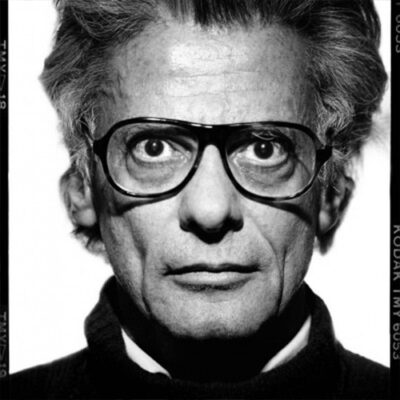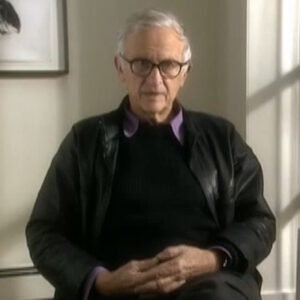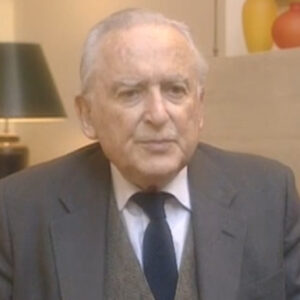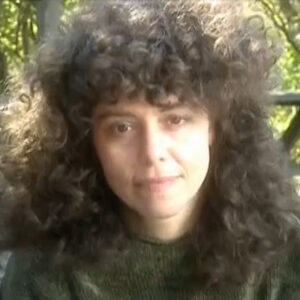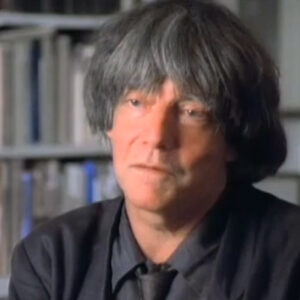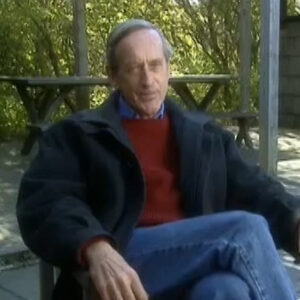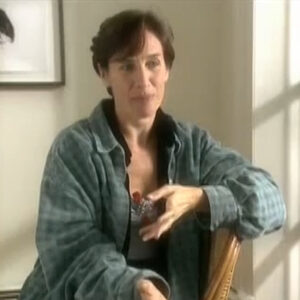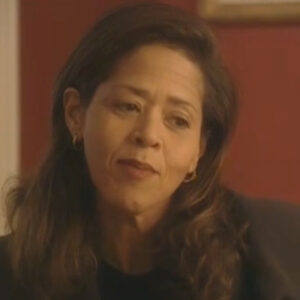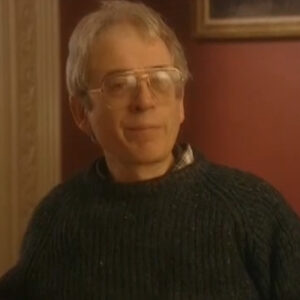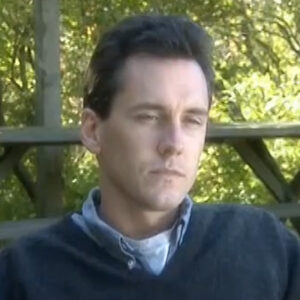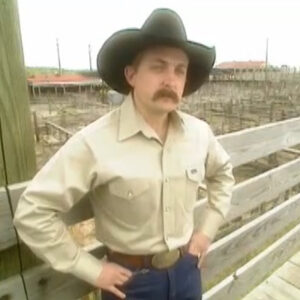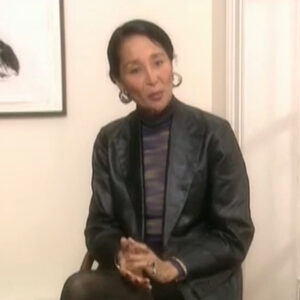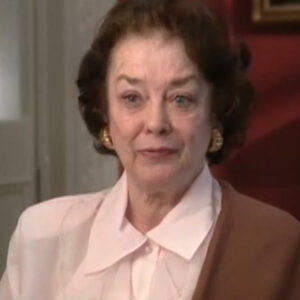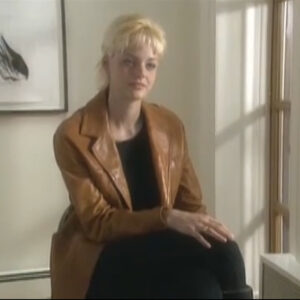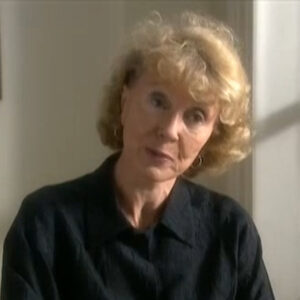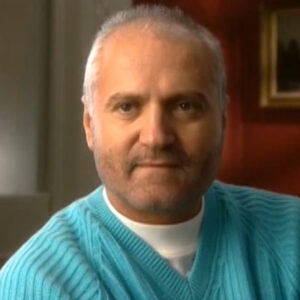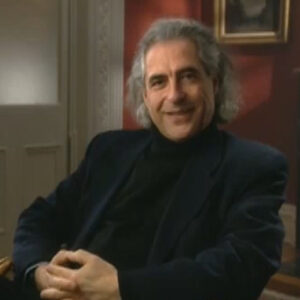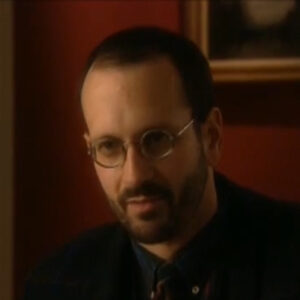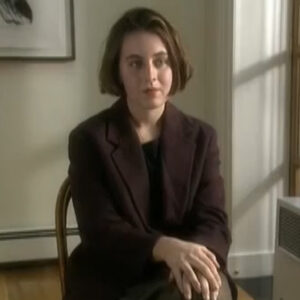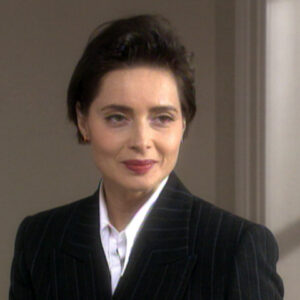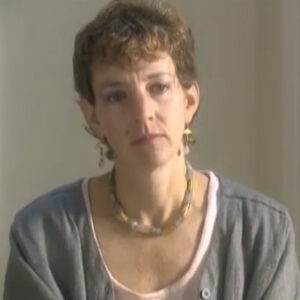Speaker OK.
Speaker I’m Donna Murphy and I play the role of Fosca in a piece called Passion, written by Steve Sondheim and James Lupine, which first workshopped about a year ago, a little over a year ago up at Lincoln Center, and then has had a subsequent Broadway production, which is still running now. Richard Avedon had seen, I believe, the workshop production. And it’s a piece that takes place in 19th century Italy and centers on the story of a young captain in the army who’s in in love and involved in a love affair with a beautiful woman in Milan and is then transferred to a post rather rural post. And he comes to meet a woman there who is the cousin of his commanding officer, who is a rather unattractive, difficult, sick woman, physically and questionably emotionally ill. She’s been very cut off from any kind of real human connection. And she meets this man and she recognizes something in him that’s different from any of the men that she’s had contact with through her, her cousin and the men that she’s met in her surroundings. She has no family other than her cousin. And she kind of zeroes in on him and desires a relationship with him initially, a friendship, but it evolves into a desire for something more. And he really doesn’t want any part of it. She becomes impassioned with. Just having a sense of purpose in in in her life, which is to connect with this man, to love this man and. That’s basically this a setup for the story and then the story goes on chronicling her pursuit of him, his response and what happens eventually in the nature of their relationship, his relationship with this other woman. So that’s that’s passion, basically. And just before you go on. Sure.
Speaker Summarize briefly what you think the heart and soul of this play is, what it is, what it’s about.
Speaker Well. It questions what love really is the boundaries of it. The issue of booting. And what the passion and and feeling of one person, what that affects can have on another. How it can change a person. How it can crack another individual. I think that those are the real issues. So Dick Avedon had seen the workshop and and then came back and saw the Broadway production and not quite sure how the idea to to shoot us, you know, whether it came from The New Yorker or something. I know it was something he was very interested in doing because he loved the piece. And actually, initially, I had gone in with two other actors from from the show. And he is intentioned hits conceptually was something completely different from what we ended up with. Shall I go on about that or. So when we were shooting, the plan was to shoot me individually and shoot the other two actors as a pair, but to bridge the two separate photos. Possibly using an article of clothing or something that would extend from one photo into the next. So when we started the session. We were working with a large shawl that that I had wrapped around me and.
Speaker I was amazed at how he. I didn’t know quite what to expect in terms of the way we would approach the work. I mean, shooting in character and I had done one other session in character, but without full without makeup and costume, just a suggestion of character for another photographer. And basically, the work all came from me in that session. And it was a wonderful photographer. But it was not.
Speaker Was it really being directed in the same way as I found myself being directed with with Dick?
Speaker He’s set a scene.
Speaker Which he somewhat borrowed from the piece in terms of a place. He said, let’s say we’re out on the bluffs, which is there’s a particular scene that takes place on some bluffs. And then the piece. But he then suggested details of of other elements to to throw into the works and to justify me being alone there. And as I said, I had this show kind of wrapped around me and we were playing with it technically to find a way to keep it open to to be utilized in this. This concept that it’s spoken of. And he takes Polaroids while he’s working, I’m sure, for his own eye. And also so he could show me what he was talking about doing. And he wasn’t it appeared that he wasn’t happy completely with what he was seeing. And then we looked at you looked at a series of Polaroids that he’d taken. They said, wait a minute. And he started cutting out the head from one and part of my body from another. And he kind of fanned them next to each other. And he said, look at this. Look at this. And it was kind of an early draft version of what he ended up doing. And I remember thinking. One of the big lessons that I’ve been learning throughout the process of rehearsing passion in watching Steve Sondheim work and watching James Lupine work, and it was being echoed again in watching him, you pay attention to everything because even something that you might dismiss as. Mistake or. Not what not the direction you thought you were going in there in, that might be a revelation of something unexpected. And as as an actress, that was this was this big lesson that just seemed to be revealing itself. Everywhere I turned when I worked with with real artists.
Speaker And it was happening again that day with Avidan. And so.
Speaker We just it was it was like an improvisatory exercise for me in the character, and it was the first time I really took the character out of rehearsal or out of the play itself and, you know, brought her to some room on the Upper East Side and played in this way, separate from. The director of the show and the writers of the show and the other actors. So some of that was a little scary and bizarre, but it was also liberating. And I found I came back later that afternoon to rehearsal at the theater. We were in previews and we were rehearsing during the day, doing the show at night and putting in changes. And James opines that, you know, how did the session go? And I said, I can’t wait to get back to work because I feel like I have found some new things in her. Nothing’s that you will necessarily see on the stage with things that I know about her, because we had an opportunity in this session to go to such extremes of emotion, emotional release. He said to me, I’m not interested in shooting. The woman, this character and finding a moment that we already see in the piece, I want to take this character and see where else she goes, where she is, when she’s alone in the bedroom or when she’s not when she’s in a private situation. But I want to see the extent of her rage, the extent of her pain.
Speaker I don’t want to see the repression of it. Said there’s no validity in that being an identifying factor of her because she’s very proud. But he said what? I’m excited about the possibility of doing a shooting just. The guts of it. What however ugly that might be, however seemingly unpalatable it might be. So that’s where we went. And there were two other my fellow actors waiting, too, to have their session with him. And I’m sure that they were hearing, you know, sounds coming out of that room. Screams and. Whaling, I just a mess. I was drained by the end of it. Physically and emotionally just exhausted yet. As I said, excited to go back to work. But I felt like I just I felt like I just shot a film.
Speaker In fact. I said to him at one point, you should direct film.
Speaker He said, Oh, darling, everyone says I. Oh, excuse me, being repetitive, but I guess he’d been told that before.
Speaker A little bit.
Speaker Why he was gone with this character, how he specifically pulled it out of the government, seizes wealth. And it’s just it’s just right. You feel him as.
Speaker That’s just what he was looking at.
Speaker How?
Speaker Well, there was a challenge in that he had certain physical ideas, you know, so he would want me moving around and he wanted me on different levels. He wanted me on the floor. He wanted me reaching out. And so to be able to keep myself emotionally in a. In a real place, a place that I could kind of live in and be private about. And at the same time let in a direction to move here and move there. And I guess it’s not that different from making a film or whatever in that way. But so you have to keep yourself open enough to let that voice in and still keep your imagination and your imaginary world vital. And in a way private so that you can remain there and and be emotionally responsive to it. So it’s almost as if he. Somehow mirrored what was going on for her, for me. He started to move almost with me. And as you said earlier, at one point. He said, let her just fall, let her fall. So I did something. Oh. At one point. He had this idea about snakes. Now, I had never talked about this with him, and I doubt that he did the same research I did on the role. But in Freud’s studies in his stereo, which was one of the books that I had read and preparing for her, a number of women who were hysterics at this time, which this character was. Had these images, dreams of snakes. And there was one woman in particular, one case study. So I had used that. And it’s, of course, phallic and. But I had used that image in my work. Nobody knew it. And he said that, and I remember I just complete it became hysterical and he started whatever directing the snakes, where they were, what they were doing to my body. I had my own impulses about what I would do to to get them off of me or to to deal with it. And but he would occasionally say, you know, beat them off. I use the shawl at one point to push them away. But earlier, I made reference to the fact that he’d said, you know, just just let her fall. Let her fall. And I went down and then he went down on the floor and was shooting from down there. And so then I came to use him also as. It was like an extension of myself. It was like a mirror. And it was a way to in some way, in a way, be appealing to someone to to let in the existence of another person and yet stay within.
Speaker This world, you know, and and he was able to do that. But I’ve forgotten about the snakes and I just useful to me.
Speaker You could solve a bit of what you’ve gone through now and see that probably a large of actors, directors, probably very concrete and specific in setting the scene, walking in, not knowing what to expect.
Speaker And just very clearly what his conception of this woman was, you know, repression, the rage and pushing you to the edge quite concretely, specifically how he pushed you to do it just, you know, in a language that’s not as dependent, which I understand on actors and directors talk to each other just as if you were telling a very simple story so bad at this revenue it was to make it possible was right.
Speaker So the paper the picture was your expectations when I nodded how I pushed you to do it. Do you want me to deal with the one concept of the photo and then moving to the second concept, huh?
Speaker Just was going for that character. How did he get your surprise? Right.
Speaker Well, I should mention that having he having seen the workshop and the Broadway production, he. He seemed to understand what I was trying to do with the character and we discussed that and we talked about the character. But what he said to me was that he was not interested in photographing her repression. What was dignified and quiet about her pain. He wanted to photograph the full extent of the rage, the full extent of it, however ugly that might be. And because he believes that there could be great beauty in that. And that’s what. He was moved by in the piece, you know, so he wasn’t an attempt to get away from what the show was about, but to zero in on something that he was most affected by and that he wanted to go for. And so he. Was able to direct me by giving me somewhat familiar circumstances, like a scene from the play, a place that she we saw her in the play. But then giving me images of things that that did not exist in the play that were maybe even more frightening. And my take me to a place that within the scope of the play itself, I didn’t go to. And he was screaming at me and I was screaming back. And it I mean, it was highly emotional. I remember I actually I was hoarse by the end of it from the screaming and the crying. And I remember my hands were shaking not because I was nervous at working with Dick Avedon, but because of what was going on emotionally, you know, in the character.
Speaker And I was just I was crying for a good 40 or 50 percent of the shoot because I didn’t know what was going to come next. This was not like rehearsing a scene where you knew from moment to moment. I mean, your job as an actor is to for it to appear as if you don’t know. But this was an improvisation of the best kind. What specifically specifically did what did you learn about your character walking out of to get those two?
Speaker In a way, I think it was stuff that I I knew, OK, because my voice to be taken out. All right. OK, OK. And thinking about what I may have learned in that session.
Speaker That I didn’t know when I came in. The strange thing is, is it’s as if it’s something I did know, but I hadn’t had an opportunity to experience.
Speaker And he almost approached it that way with me in that. In discussing the character before we shot. There was a sense of, you know, this about her and I know this about her. We don’t really necessarily see this in the play itself or we see just the beginning of it. We see her beginning to release and the scene changes. I want to take it beyond that. So it was an opportunity for me to physically, emotionally experience those things that I intellectually knew happened for her. But to actually. Scream, though, screams. Cry those tears. See, the demons be down on the floor, writhing in pain and believing the pain as part of a photo session.
Speaker Something I never believed was really possible.
Speaker And. The other thing I learned, which I made reference to earlier, was how the finest artists pay attention to everything.
Speaker A moment that another person might be quick to dismiss as an error, a mistake, a waste of time. Nothing is wasted because a moment like that might reveal something unexpected.
Speaker And so as an actress, it allowed me to go back into my rehearsal process because I was in previews. So I was rehearsing during the day and doing the show at night and not be as quick to judge something new that didn’t feel right.
Speaker I felt unfamiliar that I because I thought I knew who this character was. I thought I knew everything about her. I opened myself up a little bit more because I was on my way to to recognizing that lesson before the session. But it was like a sign from God that, you know, you’re right about this. You have to keep yourself open and not be so quick to decide what’s what’s useful, because you don’t know. You just you don’t know exactly. Exactly. And you might miss something really exciting. So what do you think? What is it about this character, this?
Speaker Gripped so much. He was fast.
Speaker Well.
Speaker She’s a woman who is physically. Not attractive. Supposedly, you know, by that society’s judgment at the time, my mind, she was plain. But what I’m.
Speaker She’d been raised by parents who told her that she was dangerously beautiful and worked her perception of who she was and what her value was. And and then when someone named her husband, she was married earlier on. Confronted her and said, honey, you’re not beautiful. And the only reason I was with you for it was for your money. And it led to the ruin of her family, etc., etc.. It was from that point on that she kind of shut down. And perhaps then became ugly. But I don’t think she would see it again by other people’s stance because she shut down, because she stopped being vital. She stopped feeling alive. But this is a woman with a vivid inner life. So, too an I I’m being presumptuous here. I don’t know the man very well, but I would imagine to an I like Dick’s. The exploration of somebody who’s been labeled unattractive. But has this rich emotional life and who loves so fully and so completely?
Speaker And who says things that. Are difficult to hear. And you don’t really want to. You don’t really want to hear a lot of what she has to say because she makes sense. She’s saying it through. Or in circumstances that are perhaps. Seems selfish or selfishly motivated on her part, but she makes she makes points and. And she is emotionally unedited. She doesn’t. She doesn’t make choices based on what will seem.
Speaker Attractive or palatable? She just is. And libs and.
Speaker Let’s her emotions fly, for better or for worse. And so I would imagine that all of those things made her attractive to him as as she was to me as an actress, you know, because unfortunately, I.
Speaker I can’t afford to be that. Unbridled emotionally. I mean, that’s kind of a sad thing, but I think most of us don’t exist in that pure place emotionally. Maybe she’s allowed me to. To edit myself a little bit less in that way.
Speaker Mm hmm.
Speaker Mm hmm. And that’s funny. Oh, yes. You just mentioned that he at one point said, I want to crack you open. And it’s interesting because that’s a phrase that was used a lot during rehearsal, but not to discuss my character, to discuss what my character does to to Giorgio, who is the the male lead in the piece. So it was interesting to hear somebody talk about cracking Fosca open because I thought of her as such kind of an open wound anyway. But again, what he saw in the piece was a lot of how she held it together and what she repressed. Of course, that’s why she was sick, because because of what she sat on. And truly, if she had over the years been as cracked open as he as he brought me to be in that session, she probably would not have been ill in the way that she was.
Speaker I know which is true of a lot of us. You know, you when you sit on your feelings and don’t allow or release can make yourself sick in many ways.
Speaker Sweet. The meal ticket described them as these boiled down essence of her character in the play. Right. Angry.
Speaker Yeah, because, well, it’s about. Yes, he you have said to me that he referred to these photos as a boiled down essence of the character, and the truth is that it’s her at her purest.
Speaker At her, because she is not. She’s confronting the demons. She could.
Speaker The ones within herself and the ones that she envisions outside of herself and.
Speaker Society.
Speaker Those were these, and when I first saw the stuff in The New Yorker, they were the first time I saw the character photographed. And. Seno here. You see her? I’m looking at a shot here. She looks like. One of the Bronte sisters. She was very.
Speaker This is what he didn’t want to get. But he allowed me to start there at a point and then he pulled me apart.
Speaker Which was hard to initially to trust. Just to trust someone else in the room and allow them and trust myself, allow myself to go there.
Speaker It’s the kind of work an actor might do by themselves or with a director that they’ve worked with for some time and have developed a relationship with and a sense of trust and understanding. But this is the first time I met the man and he brought me to my knees. He got down on his.
Speaker What was the way he was going for you again?
Speaker The way all right.
Speaker Well, he thought seem to think there was one there. There was like a primal scream in her. Another book that I reread before doing this show. So it was amazing because there were all these things that he’d say that. Were, again, things I dealt with, but had not physically. Experienced. Only intellectually explore it. There was a point in the session where I felt that I had screamed as much as I could. I had wept, whatever tears there were to be wept. I had I was spent. That was it. And.
Speaker And it was I mean, I wasn’t I didn’t feel in any way down about that. I felt like we’ve done it. And I started to get up and say, don’t get.
Speaker And he just wanted to push the envelope a little bit further. So then there was like an edge of frustration and despair that somehow I guess I mean, I can’t tell you the truth. Remember clearly what was different about the next little series, the next series of shots that were done. I just remember thinking that was it. We just got. It wasn’t enough for him.
Speaker Something you said a bit scary about the whole experience as well.
Speaker Not scary in a way that felt like I shouldn’t be there or shouldn’t be doing what I was doing. Just scary as well. I can’t. I can’t believe that this is actually going on. It’s not what I did. Envisat envision the session to be. I thought it would be a sitting. Sitting and I thought. That we would shoot the antithesis of what he said he wanted to get. I thought it would be Senora Fosca dignified, pained, certainly you would see it all, but it would be the mask of restraint. So. There was a point where I thought, am I making a total fool of myself? Because because I did have a sense of abandon about it. And there are those moments where you do something outrageous and it feels great. But then you have a second to collect yourself and you start to feel. Self-conscious. So I had a few moments of that. But they always passed quickly because we became active. He would give me a direction. And he was also very respectful of, you know, if there was a point where I said I need a moment, then I could turn away and do whatever I needed to do to whether it was, say a quick prayer or use a visualization or something to just, you know, regroup and know that I could come into the work again with with energy and focus.
Speaker So he understood that quite a challenge for people would build up. Right. Right. Yeah.
Speaker Do you see this this particular series of portraits going back to certain thematic lines in his work, his fascination, People on the Edge with Mel loves to show a whole series of portraits.
Speaker I’ll be honest, I’m not familiar enough with the body of work. I’m embarrassed to say to to comment on that intelligently.
Speaker From other particular images, though, his work with you?
Speaker Well, I’ve got the series, the book of the portraits he did out in the West America’s. I’m trying remember the title of the book. Right.
Speaker And I remember that night I came home from the sash after my show that night and open that book up.
Speaker I wanted to see what I was a part of in some way, you know? And I probably hadn’t opened the book up in a couple of years. Tell you the truth. I had gotten it as a gift from my husband. Christmas.
Speaker And. That’s just flipping through the pages, you know, and seeing these people. And the range of human experience, you know, in each face. And I thought, of course, this man knew exactly what he was doing with me.
Speaker You know, he knows somehow. How to? Zero in on kind of the rawness of being human. And so you can see how. A character like this.
Speaker Was seen to be been written for Richard. Oh, crap.
Speaker Why do you care? Well, why the session? He’s sitting right here. What he said to you. Oh, he said something about you.
Speaker Thank God you don’t look as beautiful as you want to show.
Speaker All right. So set the scene for if you walk, right. All right.
Speaker I arrived at his studio, which is like a brownstone structure on the Upper East Side and walked into the entranceway. And there was this rather striking looking gentleman sitting at the front desk. But I’d never seen him in person and I’ve never even seen a photograph of him in person. So it was and I said hello. I was with, I think my publicist and I said, I’m Don. And Murphy said, Oh. And he then made some comment, you know, saying that he was rather grateful that I didn’t look as as pitiful to the show. He was relieved to see.
Speaker And we exchanged letters also I that night I wrote him a note thanking him for letting me be a part of his work and.
Speaker I can’t remember exactly what I said to him, but he sent a note back and basically said, you know, I made some reference to the experience being enlightening for me.
Speaker And he sent a note back and he said, you know, that the Enlightenment was over.
Speaker The exciting, enlightening experience was his.

